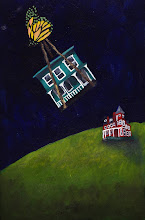
Not a Box is a book about a bunny whose box becomes all sorts of objects: race car, skyscraper, space ship, proving that a large box and a small child equals hours of fun.
French thinker Roland Barthes wrote about the symbolic influence of toys on children in his seminal text Mythologies. Most toys, he argued, are mere replicas of the adult world, shrunken to miniature size so that children can be socialized to act out their future roles in society. From babies who wet their nappies to guns to arm soldiers, these so-called playthings not only establish gender identity, but also encourage children to become users, not creators. Thus, children take on a passive role, reinacting a defined persona instead of the creative role by inventing a new game. The superior toy for Barthes? Wooden blocks.
Take this a step further in our modern society. Video games foster the ultimate 'user' mentality, as those playing are rewarded for matching the set parameters of the game, not for their creativity. In fact, try to mix things up in a video game by driving off road or shooting something other than the target, and you'll find your game short-lived.
As the Bacchanalia of toys is upon us, I think back to the toys which have lasted and those which have been long discarded. What possibilities did the lasting ones offer that the others did not? I've often reminded my children that Laura Ingalls Wilder loved her 'doll' Susan, which was actually a corncob with a kerchief, proving that the most imaginative child can turn even the simplest object into a treasured one. And that may be a role which children can teach to adults.





No comments:
Post a Comment